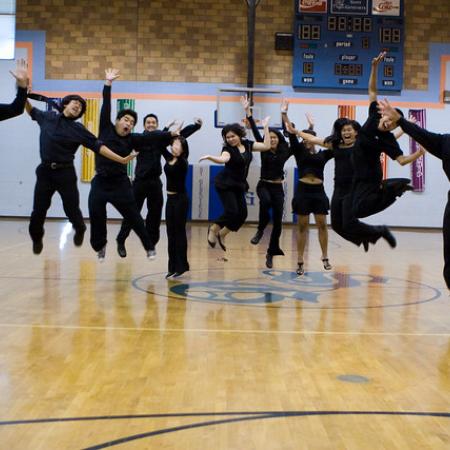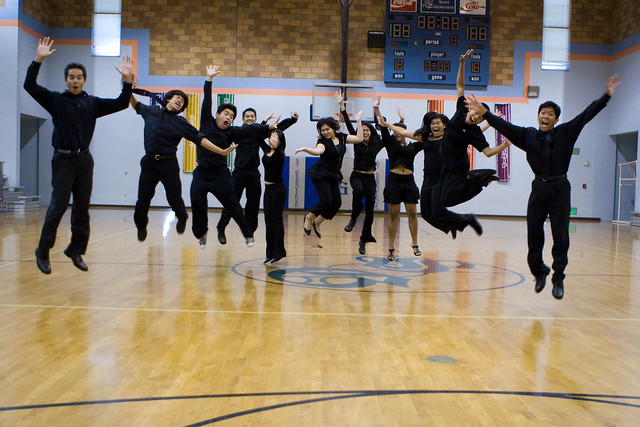dēmos is sinds 2025 deel van publiq vzw. We blijven maatschappelijke ontwikkelingen die de cultuur-, jeugdwerk- en sportsector vormgeven volgen en werken aan gelijke participatiekansen. We staan voor cultuur, jeugdwerk en sport die aansturen op maatschappelijke veranderingen en bouwen aan een meer open, inclusieve én democratische samenleving.
Is Singing, or Choir A Sport? And what does it teach us about including refugees?
item_left

item_right
Is Singing, or Choir A Sport? And what does it teach us about including refugees?
Is singing a sport? It makes a good question for an animated debate at your sports club cafeteria. What’s the difference? Singing, just like sport, involves physical exertion and skill. It is an individual as well as a team effort. And yes: entertainment, competition and an audience are involved. Why wouldn’t it be a sport? On the other side: You don't get fit by simply moving your mouth. Do you?

‘Singing me In’, a recent Erasmus+ partnership that focused on collective singing in the integration process of young migrants, offers some interesting insight into the debate. Singing, or choir, is a collaborative practice, just like the sport. The same barriers have to be overcome in order to include or participate. We had a look at the ‘Sing Me In-handbook’ and highlighted one story we think can be helpful for your future (pilot) project.
In chapter 2 - on attitudes - we read the story of Louis. Louis survived the genocide in Rwanda but lost his entire family. He fled and made it to Norway, where he joined a multicultural choir. Professor Anne Haugland Balsnes documented his story.
“Why would we assume collective singing with refugees requires a handbook like this?” Louis asked. “Is it not just like any other choir or form of collective singing? Is it not strange to assume that collective singing with refugees is any different than singing with anyone else?”
These are important questions. Not only because we should not fall into the trap of diminishing people to the label ‘refugee’, but also because you should take a look at what makes the difference.
What makes the difference?
“People all over the world presumably share the same dreams and hopes for their own lives, but their starting point and path towards those goals can be very different. Most likely, an important difference between you and the people you will get in touch with during your project will be the road that led you to wherever you meet. After experiencing a hazardous journey and fleeing far, far away from your home, you would probably have some different perspectives on several parts of life. You would also be in greater need of a friendly face, a hug or any warm welcome wherever you are.”
That is why Louis’ choir conductor developed this specific philosophy and the routines for his choir practices, and that is the reason why you should consider some different aspects in terms of your own attitude, preconceptions and knowledge while working with refugees.
“There are also some potential differences in terms of culture, tradition and the participants' relationship to music and singing in general, and also how such activities are organized. This may affect both your practical approach and how you should approach the work in terms of pedagogy as well as your general attitude when organizing and conducting your project.“
The report sums up 2 key aspects Louis asks you to consider: (1) A warm and friendly fellowship and (2) Process, not the product
A warm and friendly fellowship
Barriers are often related to the participants earlier experiences or lack thereof. The entire activity may be unfamiliar to some, and well known to others. The challenge here is to keep a suitable balance between these two aspects.
It’s important to have an open-door policy, a friendly and warm approach and keep the dialogue open and ongoing. You have to be flexible. But Louis also advices to stick to your schedule and convey your expectations as best as you can to the participants.
To summarize: Be respectful, humble and open to whatever may occur and what differences may surface. The best way to make this happen is to increase your own knowledge as well as take a critical look at your own culture and what you represent. If you succeed in this, you should succeed in creating a warm, open and friendly fellowship where magical meetings can take place.
Process, not product
Another aspect which is critical to reflect on is your goals and aim for the project. A pitfall that has been mentioned in several areas of research is the danger of “instrumentalising” refugees. This issue is quite precisely summarized by Tania Cañas, Arts Director of the Australian organization ‘RISE: Refugees, Survivors & Ex-detainees’, in a text about 10 things to consider in artistic work with refugees (Cañas 2017).
“Critically interrogate your intention.” She urges “Our struggle is not an opportunity, or our bodies’ a currency, by which to build your career. Rather than merely focusing on the ‘other’ (‘where do I find refugees’ etc.) subject your own intention to critical, reflexive analysis. What is your motivation to work on this particular subject/matter? Why at this particular time?”
In short: your attitude towards this project is that your focus should be on the process. How will your project contribute to the quality of life of your participants? What are they gaining from taking part? You must stay aware of how you approach refugees and focus on the process.
Sources
- SING ME IN 2018. Collective singing in the integration process of young refugees. Handbook 'Singing with groups of young refugees' published by the European Choral Association 'Europa Cantat' for the “Sing Me In” Project.
- RISE 2017. Cañas, Tania. ‘10 Things You Need To Consider If You Are An Artist – Not Of The Refugee And Asylum Seeker Community- Looking To Work With Our Community’

